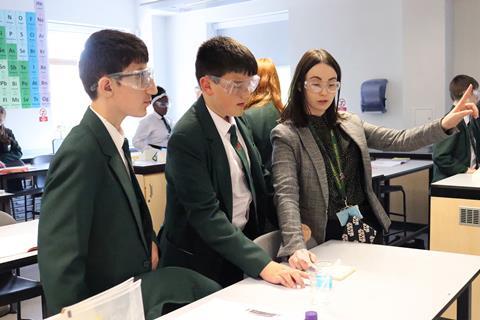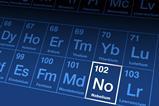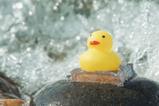Meet Emma Owens, a chemistry teacher with a passion for curriculum design, after-school science clubs and learning from others

The idea of becoming a secondary school chemistry teacher struck Emma Owens during her PhD at the University of Sheffield. During term time, she supported undergraduate students in the chemistry department’s teaching laboratories for one and a half days a week. ‘I worked in the labs with the undergraduates doing small group demonstrations, checking the set-up of equipment and marking and giving feedback on their lab reports,’ says Emma.
The University of Sheffield has a joint degree programme with China’s Nanjing Tech University, so when the opportunity arose to visit China and teach in its undergraduate labs, Emma jumped at the chance. There, Emma had more autonomy and responsibilities and gained experience teaching much larger groups of students. ‘It was a lot more intense, but I did really enjoy it,’ she explains.
Once home, Emma started looking at routes to becoming a teacher after completing her PhD. She attended a large science teaching conference and began doing more outreach events, both at the university and in schools for primary and secondary school children.
In summer 2019, Emma joined the two-year-long Teach First programme to train as a secondary school chemistry teacher. She trained at the Horizon Community College in Barnsley, where she now has a permanent teaching position and is also an assistant subject leader of science.
Light bulb moments make all the planning and effort that goes into teaching 100% worth it
Among Emma’s responsibilities is curriculum design, and in 2021 she was awarded the Royal Society of Chemistry’s Early career prize for excellence in secondary and further education for her work on Horizon’s curriculum. Its curriculum is designed to check and build on prior knowledge and to make sure all students learn the same information, regardless of who teaches it.
Emma is a strong advocate of after-school clubs. In her extracurricular sessions, students explore off-curriculum topics and do project-based activities. Students gain confidence in their scientific abilities and practise how to work in a team, she explains.
What is your earliest memory of science?
Looking at a dead bee under a microscope with my dad. I could see the detail on the wings and legs, and I just thought that was fascinating.
Did you have any particularly inspiring teachers and what was it that made them stand out?
Mr Smith, my GCSE maths teacher. When I was disappointed to learn that our whole year group was to sit the foundation level statistics paper, he helped me at lunchtimes and after school so I could prepare to take the higher paper instead. I came out with an A! He helped me have confidence to push myself even when others might not believe in me.

What is the single most important piece of advice you would give to any student or trainee teacher?
Don’t be scared to ask for help! There’s such a wealth of knowledge both in your own school and the wider teaching community. Participate in online groups, use online forums and join educational bodies. If you don’t ask for help you won’t learn how to improve.
What is your favourite chemistry topic to teach?
Chemical bonding. It’s one of those topics that students find conceptually tricky initially. After a lot of modelling out of the concepts and practice, I find it’s one of the topics students generally do succeed very well with.
What is your proudest career moment to date?
Winning the Royal Society of Chemistry’s 2021 Early Career Prize for Excellence in Secondary and Further Education. That was just amazing. It was so hard having to keep quiet about having won it for so long!
Nominate someone for an Education award
Inspired by Emma Owen’s Early career prize for excellence in secondary and further education? Want to nominate someone you know for an award? Visit the Prizes page to find out more.
What is the best thing about teaching?
Those light bulb moments when a child has been really struggling with something yet working really hard, then all of a sudden it clicks for them. Those moments make all the planning and effort that goes into teaching 100% worth it.
What’s the hardest thing about teaching?
Motivating students who are demotivated and have no confidence in their own ability. It’s not easy to persuade my current year 11s to try things since they have spent so much time learning from home and still have uncertainty about the content of their GCSEs.
If you could go back in time and make any historical scientific breakthrough, what would it be?
Advancements related to surgery. As a child I remember going to a medical museum in Leeds and seeing an exhibit about how leg amputations were done in the past. We take it for granted now that medical advancements have made operations safe: we have anaesthetics, can keep everything sterilised and have excellent pain medication.
What keeps you awake at night?
Climate change. Freak weather storms, temperature changes, wildfires and flooding are having a devastating effect on people and animals. Things are spiralling out of control, and some people don’t seem to care about what is happening. It’s vital we teach children about climate change and why it’s important to take action.














No comments yet